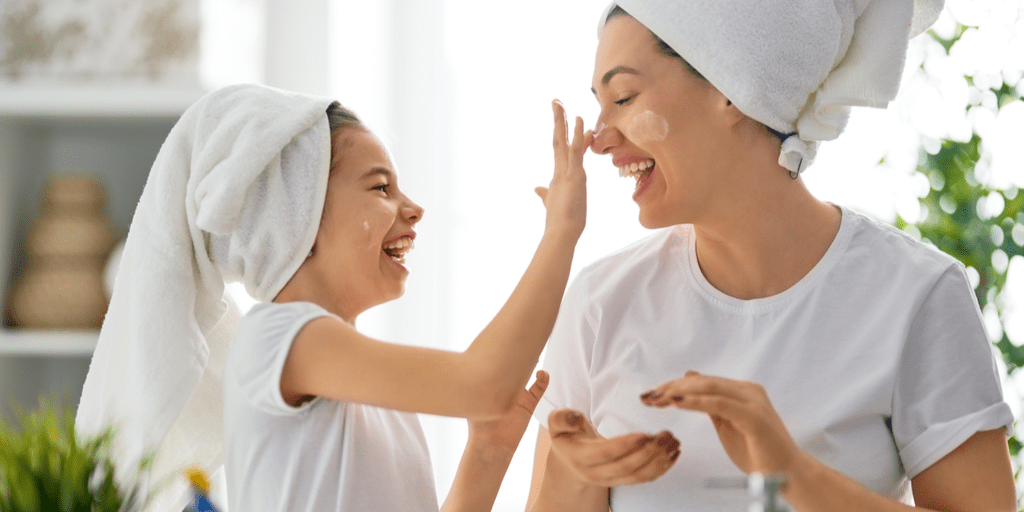As parents, our children watch and follow our every move so it’s important to teach them healthy habits including taking care of our skin. Teaching children about proper skincare is essential because these are habits that they will carry with them forever. If children learn how to properly clean their skin and prevent skin damage at a young age, their skin will be healthy as they age. Having a healthy skincare regiment isn’t hard, but it’s something you need to work with your child on to help them develop and master it.
1. Wash your face with lukewarm water.
When washing your face, you should always use lukewarm water instead of extremely hot or cold water. Using lukewarm water is key because extremely hot water will irritate the skin and cold water will not properly remove all the dirt. To teach your child about lukewarm water, the water should be similar to their bathwater; if they cannot stick their hand under the water faucet as the water comes out, the water is too harsh to use on their face. With younger children, you should stand with them while they wet their bath cloth so you can ensure they are using the proper water temperature.
2. Clean your face every night.
Children are often forgetful, and as parents, it’s crucial to teach them the importance of washing their faces every night and develop a routine to ensure it happens. If children don’t wash their faces every night, they are going to sleep with dirt, bacteria, and germs lingering on their faces. Similar to how children use chore charts, you can create a chart for your children where they have to mark off each night when they wash their faces and brush their teeth. Each week that they clean their face every night, they can have a certain treat or privilege. If you want your children to have a proper face cleansing routine as an adult, teaching them the importance of it now will be incredibly helpful for them in the future.
3. Use gentle skincare products.
Children should use skincare products that are gentle and free of dyes, fragrances, and unnecessary chemicals. By teaching your children to use gentle products, they will avoid harsh ingredients that irritate their skin. Your children might want to purchase products that showcase their favorite characters or have a certain scent, but it’s important to teach your children to choose skincare based on ingredients and quality.
4. Limit your time in direct sunlight.
Most children spend a great amount of time playing outdoors, and time outside means time spent in the sun. Spending time in the sun can damage your children’s skin, and one sunburn is one too many. As a parent, you can teach your children to limit their time in direct sunlight and seek shade when it’s available. You can model limiting time in the sunlight by using an umbrella at the beach or finding shade at the park. If your children are spending time outside, you need to make sure they have the appropriate gear to limit exposure to direct sunlight. Wearing rash guards, hats, and sunglasses are always great ways to teach your kids how to avoid the sun’s direct rays.
5. Always wear sunscreen.
If your children are spending time in direct sunlight, they should always wear sunscreen. As a parent, one of your most important responsibilities is to keep them healthy, and one of the ways to do that is to make them wear sunscreen. Wearing sunscreen helps to prevent sunburns and sun damage to their skin as they age. Whether it’s playing at the park, swimming in the pool, or riding bikes in the neighborhood, sunscreen is essential for all outdoor activities. For proper sunscreen usage, you should apply it 15 minutes before activities begin and reapply every 2 hours—unless you are wet or sweaty which means it should be reapplied more frequently.
6. Avoid picking at acne or scabs.
It’s vital to teach children the importance of avoiding picking at acne or scabs. You should teach your children that picking at acne or scabs will lead to scarring that they could carry with them into adulthood. Children should also be taught the importance of not picking at facial blemishes because it opens them up to bacteria and leads to scarring. To help children cope with acne and stop picking, you can have them wear bandages on their faces or clothing that covers scabbing so they will not be tempted to pick at them.
7. Never sleep in your makeup.
If you have preteens, they need to know that beauty sleep is real and an important step is that you never sleep in your makeup. It’s key to teach them that makeup must always be rinsed off no matter how little you wore or how tired you are. As the parent, educate your preteens that wearing makeup to bed means their face is not clean and could lead to breakouts and blemishes. It might seem silly to stress the importance of always washing makeup off, but the habits they develop now are the ones they will carry with them as they become teenagers and young adults. While wearing minimal to no makeup, preteens should develop the habit of washing their daily so they will continue to do so as they age and wear makeup on a more regular basis.
For adults to have a proper skincare routine, they will build off the skills and habits they learned when they were children. As a parent, it’s key to work with your kids and teach them a healthy regimen. Children will learn differently so it’s important to work with them individually to ensure they understand the importance of taking care of their skin and how to do so. If you have any questions or concerns about your child’s skin, please feel free to contact us and schedule an appointment.



